Jamal Sims grew up in Los Angeles, so he never got to see Grease on stage. However, he was seven years old when the classic movie musical version arrived in theaters, and since it played at a cinema right across the street from his house, he saw it multiple times.
“Every Friday, when it was in the theater, that was my treat — after the full week — to go there and watch the movie,” Sims told Below the Line during a recent Zoom call. “I watched it every week. So, it’s huge to me. It’s big.”
That little boy, surely more than a tad inspired by the slick moves of Danny, Sandy, Rizzo, and the rest of the gang at Rydell High, found his calling as a choreographer. His many credits include music videos for Usher and Dru Hill, as well movies and television shows such as Step Up, Hannah Montana: The Movie, Footloose, Aladdin, RuPaul’s Drag Race, Encanto, and Beauty and the Beast: A 30th Celebration.
Sims’ latest project, Grease: Rise of the Pink Ladies, brings his career full circle and represents a major step forward as well. He served as Choreographer of the new Paramount+ show and directed one of its 10 episodes. The colorful, high-energy musical-comedy series, which debuted this past week, unfolds in 1954 and follows the formation of the titular Pink Ladies.
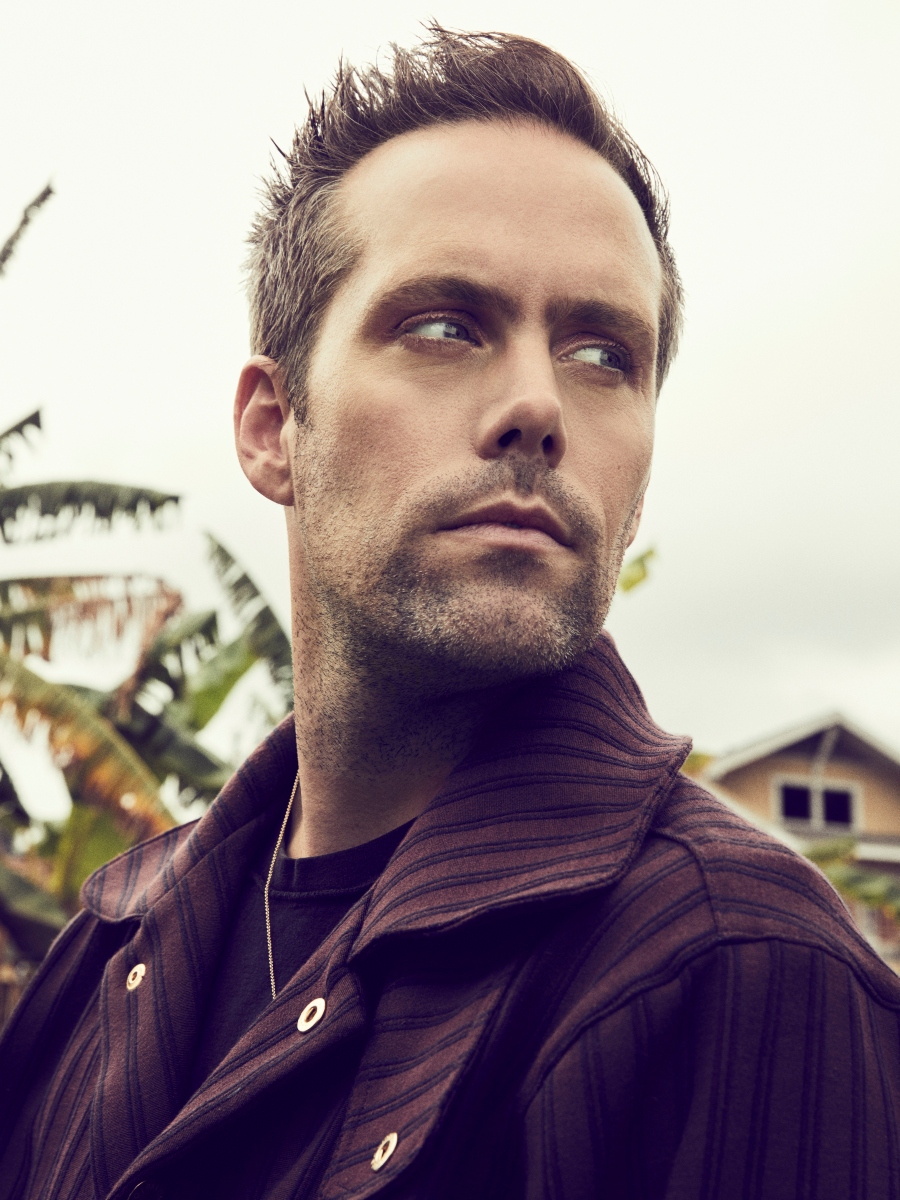
Working alongside Sims was Justin Tranter, the Executive Music Producer and Songwriter for Grease: Rise of the Pink Ladies. The Grammy and Golden Globe-nominated Composer and songwriter, who crafted 30 new songs and reimagined the classic “Grease is the Word” for the new series, cited Grease as a massive influence on their career choice.
“It was one of the reasons that I ever realized that music was a thing, watching it so young… and all movie musicals, Grease being one of them,” said Tranter, who has penned songs for Selena Gomez, Nick Jonas, Lady Gaga, Miley Cyrus, Imagine Dragons, Demi Lovato, Dua Lipa, and Justin Bieber, among others.
“I was so obsessed with how and why it was happening. To be able to watch something and listen to it afterward? My young brain trying to understand that and love that is a huge reason I’m here. For me — with Grease — my favorite part was always the Pink Ladies, without a doubt. When I heard that this project was happening, I harassed as many people as I could to try to be involved.”
Here’s what else Sims and Tranter told Below the Line about working together on Grease: Rise of the Pink Ladies, as well as their upcoming projects, which include Drag Race Live! and a new movie musical starring Idina Menzel.
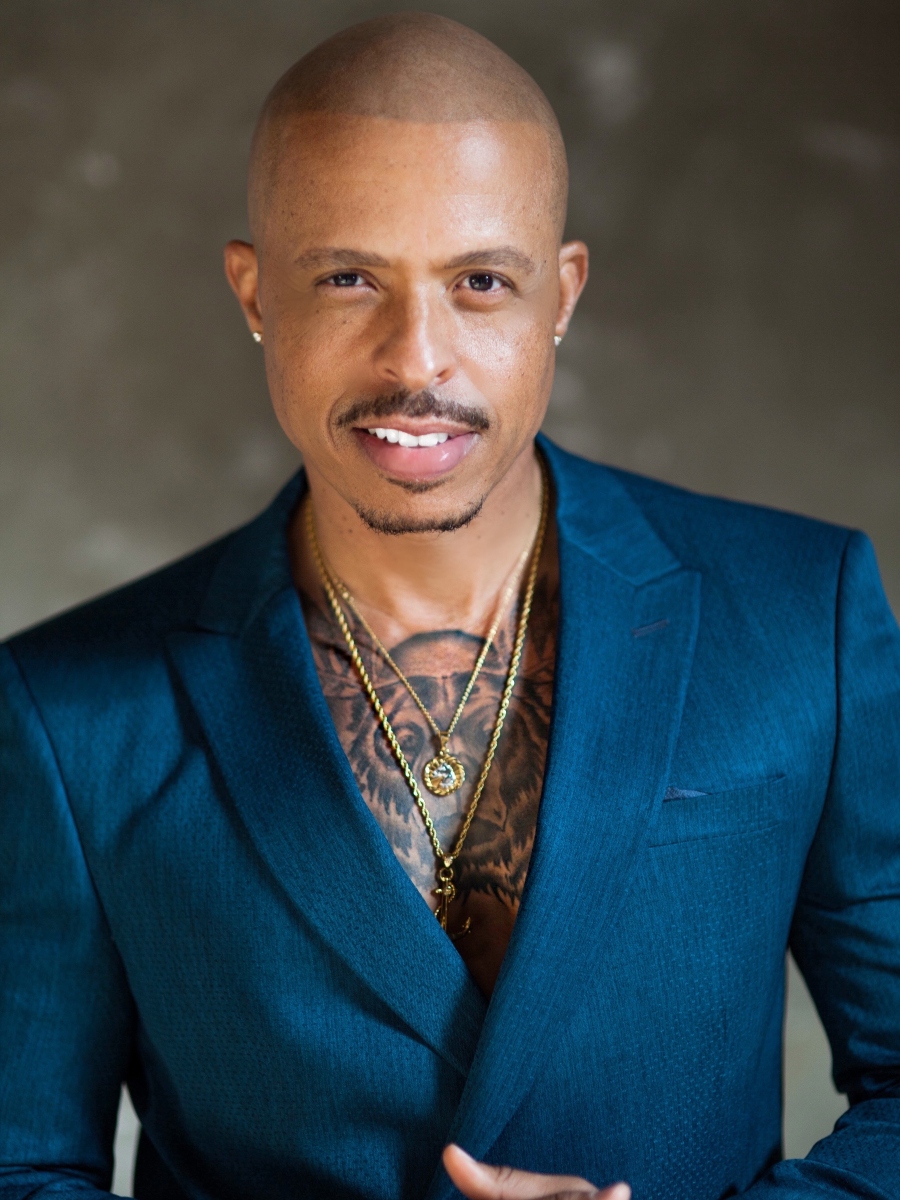
Below the Line: Some people love Grease 2, but many more folks feel it somehow tarnished the original film. What was your initial reaction when you heard about a show centered on the Pink Ladies?
Justin Tranter: I’ll go first, because my immediate reaction when I had heard about it — that it was happening — no one was talking about it, saying, “Do you want to do it?” I just heard about it. I thought that it was brilliant, whoever’s idea it was to get back into the world of Grease by telling the origin story of the Pink Ladies. That, to me, felt so smart and [like] such a fresh way to do it. Then, when I read the pilot, I was beyond sold and I groveled to be the songwriter for it. I thought it was brilliant.
Jamal Sims: Me, I was like, “I don’t know. I don’t think so. Why? Why do we have to touch this? Everybody’s touching all this stuff.” I didn’t feel like there were enough things [to do] with the Pink Ladies. I didn’t know if there was enough backstory for [them], and then I was pleasantly surprised. I was wrong. I read the pilot and I was like, “I am in. I am into it.”
Tranter: Actually, Billy Porter — who was in the revival on Broadway — is a friend of mine. I told him I was doing it and he said, ‘Why? Stop.’ Then I told him a little bit about [Creator and Showrunner] Annabel Oakes and not just about the Pink Ladies, but the different people who all lived in the ’50s. Jamal, his parents grew up in Southern California in the ’50s. Those characters weren’t in Grease, the original. When I told Billy Porter Annabel’s take on it, he said, ‘Oh yeah, you should do it.’
Sims: Oh, that’s why you did it!
BTL: Once you bought into Annabel Oakes’ vision for Rise of the Pink Ladies, what did you see as your job on this project?
Tranter: Before I met with Annabel to try to get the job, I watched Grease three times, of course, and then I watched Grease 2 once. Looking at the music, the blueprint is lots of ’50s nostalgia, but [it’s not] afraid of modern elements. “Grease is the Word” is a straight-up disco song. There were current pop songwriters brought into the movie version versus the Broadway version, so I thought, “Okay, my job is to have lots of ’50s nostalgia, but just like the original songwriters, do not be afraid of current elements.” They weren’t afraid, so I shouldn’t be afraid. And then, the most important thing in any musical is, the story has to come first. [So my job was] “just rip Annabel’s brain apart to learn as much as I can about these characters she’s created, so I make sure their emotions are being represented.”
Sims: Mine is very similar to Justin’s. I just wanted to make sure that the visual language of the movement felt familiar, but also pushed [a bit] because we didn’t want to do the same thing. If we were doing the same thing, then why do it? I just wanted to make sure that we were making something that would hold up today if you had never seen the original, and [where] you felt like you were getting something new and fresh. That was what was most important to me.
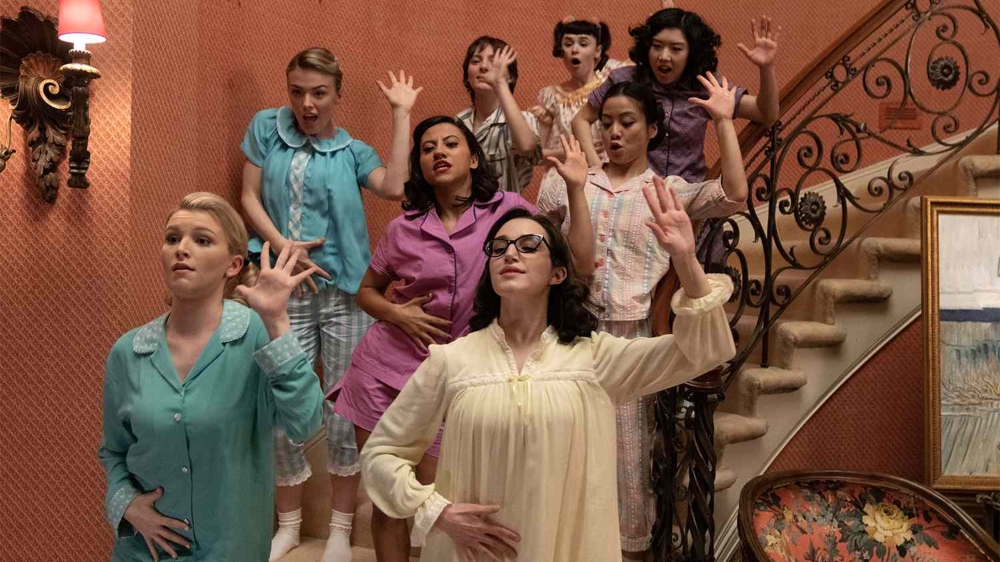
BTL: What impressed you about the work done by the original Choreographer, Patricia Birch, and Bill Oakes, the original Music Supervisor? And how much of that did you want to capture — or recapture?
Tranter: Those are some of the greatest songs in movie musical history. It’s hard to say, “I liked this part.” They were smashes. They were radio [and] Billboard-charting smashes from a movie musical, which happened a lot two decades before Grease, but at the time, it was kind of an anomaly. Cabaret is one of the greatest movie musicals ever, and not too far off timewise from Grease. I worship those songs, but [they] didn’t make their way to the radio. I think I just answered my own question. I found my answer. It was [about] doing [it] like the original Grease did; you have to tell the stories but have pop and rock n’ roll sensibilities. Those are my favorite things they did. It’s a musical first. It’s storytelling first. But there were enough pop and rock elements that the songs could be on the radio. The songs could go the distance.
Sims: When I came into this, Patricia Birch was everything to me in her attention to not only the moves and the choreography but to the characters. Each character moved differently and she really keyed into it. She also was able to fill a frame in a way that hadn’t been done in a while in movie musicals. I really wanted to make sure that I understood that going into this one. Having talked to Olivia Jones, who was our Director and Producer, and Annabel Oakes, our Showrunner, that was one of the things that they were into — making sure that each frame felt like it was full and that the dancers were in character the whole time so it didn’t feel like a group of everybody doing the same exact perfect move. It was a little raggedy, in the movie. Some arms were this way. We really wanted to capture that, [which] was fun for me because when it’s too clean… it’s not [as] smooth.
BTL: You directed an episode, Jamal. How did that go? And what was it like to see your name on a cut of an episode?
Sims: Honestly, it’s a dream. It feels like I’m asking myself, “Did I do that?” because, coming into the show, that’s what I wanted. Signing on as a choreographer, I really just wanted to direct. I wanted to direct and choreograph because I loved the original so much. I felt like I knew this story and I wanted to do both. When the opportunity came up and they asked me to do it, it was like a dream come true.
To be able to work with the actors that I had been working with for the first five episodes up until I did my episode was nice because I really knew them. I was able to connect to them in a way that I don’t know that other directors who were just coming in were able to do [while] working with them. I knew their strengths and I knew their weaknesses, and it was easy to work with them in that kind of way.
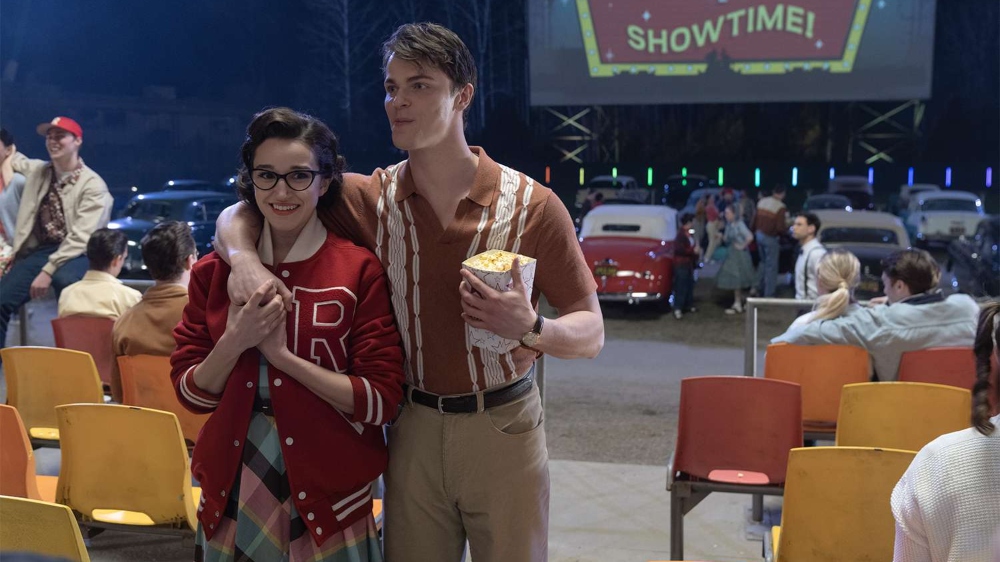
BTL: Music and choreography literally go hand in hand. What kind of a working relationship did the two of your forge?
Tranter: When we started, we were trying to follow all the traditional TV protocols of, “a song must be sent to this executive’s assistant, and the executive approves.” Then it gets sent here, and it gets sent there. We realized very quickly that we were not going to survive that process, so it had to be like, ‘I’m going to just start texting you songs. I’m going to make sure that your choreography assistants have them in their inboxes as I’m working on them so that you know where I’m heading and so that you don’t all of a sudden show up to set and the song is completely different than the last time an executive sent it to you.’ We had to start working directly or we were going to fail.
Sims: We had 30 original songs, plus one of the remakes, you know what I mean? We had no time. We had to go directly to each other or else we weren’t going to make it.
BTL: Who could you not do your job without?
Tranter: Thank you for asking that. I had a small and mighty team of me plus four people, and I literally could not have done it without any of them. Eren Cannata and Daniel Crean produced all the tracks with me. Brandon Colbein and Brittany Campbell co-wrote the songs with me, and I assigned each of them to different characters. One of them wrote for two of the Pink Ladies, and the other one wrote for the other two Pink Ladies. When it came to songs for other characters, I would choose them based on their melodic sensibilities.
Sims: I had two Associate Choreographers, Jeffrey Mortensen, and Louise Hradsky. I had worked with them on another project. They wanted to do this, and I was like, ‘Absolutely!’ It was just us three. We had a group of skeleton dancers. When I say skeleton, we would build the numbers with them, and then when the actors came in, we would replace them with actors. The list goes on with that. There are so many names, and I don’t want to miss anybody, but they were all so important to my process.
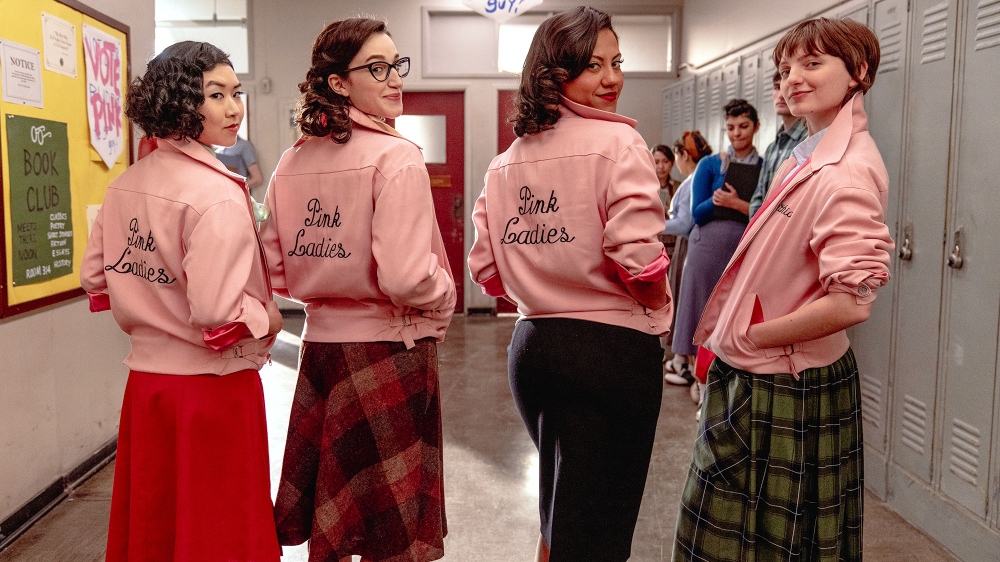
BTL: What else are you working on?
Tranter: I just came back from the East Coast. I was working with the amazing Renee Rapp, who is a pop star but also is doing the Mean Girls movie musical. I’m working on a musical with Idina Menzel, Eve Ensler, and Diane Paulus. I’m always in with different pop stars every day but never allowed to say who it is until they post it on social media.
BTL: You’ve also been busy with Miley Cyrus…
Tranter: Oh, yeah. I just had the Miley song (“River”) come out. It’s exciting.
Sims: I love it. I put up the Drag Race Live! show I directed with RuPaul in Vegas, and right now we’re introducing new queens to the show. That’s what I’m doing currently, but I’m also working on a pilot for Disney.
Tranter: Oh, excuse me!
BTL: If audiences love Rise of the Pink Ladies and Paramount+ elects to greenlight a second season, how ready are you both to return?
Tranter: I am so ready. Annabel and I are fantasizing about things that we can do all the time. Fingers crossed! Hopefully, everyone loves it as much as we do.
Sims: Yeah, I’m ready to go back. It was such a fun show to do. It was challenging.
Tranter: It’s the hardest thing I’ve ever done. I may be a glutton for punishment, but I can’t wait for more.
The first two episodes of Grease: Rise of the Pink Ladies are now streaming on Paramount+.





